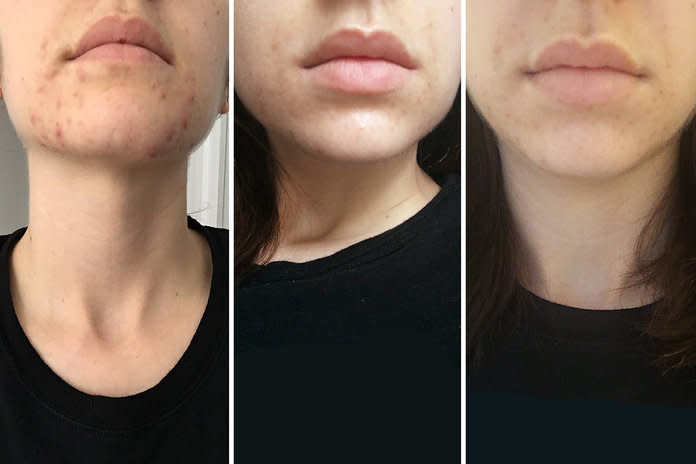I Took Blood Pressure Medication for My Acne — and It Worked
When I was struggling with hormonal acne, my bathroom looked like a Sephora stock room. My medicine cabinet and drawers were stuffed with every spot treatment, mask, serum, and exfoliator I could get get my hands on. Even though I did my research on what ingredients are good for clearing up cystic acne and read countless product reviews, nothing I tried worked.
Defeated, but still not desperate enough to resort to trying birth control or Accutane, my dermatologist suggested spironolactone, a prescription blood pressure pill that also can clear up hormonal acne.
RELATED: This Pill May Be the Answer to Fighting Hormonal Acne
My dermatologist's office wasn't the first place I had heard that spironolactone was an effective hormonal acne treatment. I came across the pill in my Google search results when I first started breaking out. Even though spironolactone is known as the "miracle pill" for hormonal acne in many of the firsthand accounts you read on the Internet, I never completely understood how it worked until my own dermatologist explained it to me.
Taking spironolactone for hormonal acne is an off-label use of the drug, so how it actually works can seem confusing. That's why I turned to Jeanine B. Downie, MD, FAAD, and director of Image Dermatology PC in Montclair, New Jersey to break it down for me.
"Spironolactone is an oral anti-androgen agent, so it actually helps to counter hormonal levels of antigen and decrease hormonal acne that in many cases, is associated with your menstrual period or chest with stress," explains Dr. Downie. "You do see the best results around your chin and your jawline."
RELATED: The Best Drugstore Acne Products, According to Reddit
The pill is becoming a popular treatment option for women because it has minimal side effects. Since spironolactone is a diuretic, it can make you pee more often. Other common side effects include breast tenderness, lumps, irregular periods, and headaches. Talking these potential symptoms over with your dermatologist is crucial to figuring out whether it's the right treatment option for you. For me, I have a low blood pressure to begin with, so since spironolactone brings down blood pressure, I started off on a low dose to see how it would effect me.
VIDEO: Beauty School: How To Get A Bronzy Glow Like Jennifer Lopez
However, don't expect to see results overnight. Dr. Downie tells me that the medication can take three months or more to kick in, but there's a number of factors that make it vary from person to person.
"It honestly depends on your family history, your compliance with the overall acne regimen your dermatologist has given you, your internal stress, your hormonal levels, and how much you exercise," Dr. Downie says. "The more exercise the better, because it helps decrease stress hormones and modulate your acne. Also, if you're not sleeping or eating properly (dairy, soy, nuts and/or gluten are implicated in some acne cases), those two factors could affect your acne as well."
When spironolactone does work, it works well. And the proof is in my before-and-after photos:

The writer's skin before taking spironolactone, after two weeks taking the pill, and four weeks after taking it.
Like Dr. Downie said, it can take months before you start to see any improvement in your skin. But for me, I noticed a difference in the deep, painful cystic zits on my chin a few weeks into taking spironolactone.
Today, my skin is completely clear save for the occasional whitehead. Looking at what my skin used look to like never fails to shock me. I'm not alone. The fact that everyone's experience with spironolactone can be dramatically different is why the drug has its own hashtag where women share their personal journeys using it.
See how spironolactone has worked for some women's hormonal acne below:
The biggest question I had for my dermatologist before going on spironolactone was if I would have to take the pill forever. It turns out, that varies, too. Dr. Downie tells me that a lot of her patients have successfully tapered off of the medication, and that a healthy diet and exercise can help get patients off of it quicker.
However, it's tough to predict whether or not your hormonal acne will come back because factors like hormonal levels, stress, and genetics are all major factors that affect your skin.